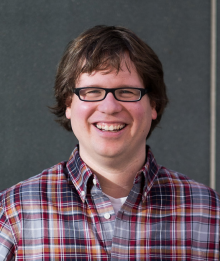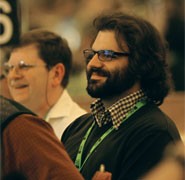This event was sponsored by the University Librarian's Speaker Series on Emergent Research in Digital Scholarship.
On behalf of York University Libraries, Joy Kirchner is delighted to welcome Ian Milligan (Assistant Professor, History) from the University of Waterloo and Nick Ruest (Digital Assets Librarian) from York University to give the inaugural talk for the University Librarian's Speaker Series on Emergent Research in Digital Scholarship. Milligan and Ruest will discuss innovations in the web archiving collections and research methods on March 7th, 2017 at 1PM, in room 1003 in Osgoode Hall.
Ian Milligan (PhD, York University, 2012) is an assistant professor of digital and Canadian history at the University of Waterloo. He is also principal investigator of the Web Archives for Historical Research group. He serves as an editor of the Programming Historian.
the Programming Historian.
His book, Exploring Big Historical Data: The Historian's Macroscope (co-authored with Shawn Graham and Scott Weingart), appeared in late 2015. He has published on Web and digital archives in venues including the International Journal of Humanities and Arts Computing, the ACM Journal of Computing and Cultural Heritage (forthcoming), Histoire Sociale/Social History, the Canadian Historical Review, and the Journal of the Canadian Historical Association. His 2013 article “Mining the Internet Graveyard” won the Journal of the Canadian Historical Association’s best article award that year. These complement publications in other Canadian academic journals and a 2014 monograph with the University of British Columbia Press entitled Rebel Youth: 1960s Labour Unrest, Young Workers, and New Leftists in English Canada.
Nick Ruest is the Digital Assets Librarian at York University, and is also a co-principal investigator of the Web Archives for Historical Research group. He has published on  Web and digital archives in the Code4Lib Journal, the ACM/IEEE Joint Conference on Digital Libraries, and Digital Studies / Le champ numérique.
Web and digital archives in the Code4Lib Journal, the ACM/IEEE Joint Conference on Digital Libraries, and Digital Studies / Le champ numérique.
At York University, he oversees the development of data curation, asset management and preservation initiatives, along with creating and implementing systems that support the capture, description, delivery, and preservation of digital objects having significant content of enduring values.
He is also active in the Islandora and Fedora communities, serving as Project Director for the Islandora CLAW project, lead on the Fedora Import/Export initiative, member of the Islandora Foundation's Board of Directors, Roadmap Committee, Fedora Leadership group, and committer on both projects. In the past he has served as the President of the Ontario Library and Technology Association, moderator for the OCUL Digital Curation Community, and President of the McMaster University Academic Librarians' Association.
Capturing the Web Today for Tomorrow: Innovations in capturing and analyzing social media and websites for the new scholarly record
Tuesday March 7, 2017, Osgoode 1003
1:00 pm – 2:30 pm
In their presentation “Capturing the Web Today for Tomorrow: Innovations in capturing and analyzing social media and websites for the new scholarly record” Ian and Nick will highlight work from their Web Archives for Longitudinal Knowledge project.
The growth of digital sources since the advent of the World Wide Web in 1991, and the commencement of widespread web archiving in 1996, presents profound new opportunities for social and cultural analysis. In simple terms, the 1990s cannot be studied without web archives: they are both primary sources that reflect how people consume and understand media, as well as repositories that document the thoughts, opinions, and activities of millions of everyday people. These are a dream for social historians.
However, all of this opportunity brings challenges. The size and complexity of the data requires interdisciplinary collaboration. Historians might have the research questions but not the technical resources or knowledge to work with these sources, requiring outreach to other disciplines. Libraries and archives are perfectly positioned to work in this new emerging field that brings together historians, computer scientists, and information specialists.
In this talk, our speakers will discuss the fruits of one collaboration that has emerged at York University, the University of Alberta, and the University of Waterloo. Bringing together librarians, archivists, historians, and computer scientists, as well as an interdisciplinary team of undergraduate and graduate students, this distributed group is developing several web archival analytics projects.
They work using a combination of centralized and de-centralized infrastructure to run data analytics, store web archives, provide a publicly-facing portal, and collaborate. Ian and Nick will discuss the challenges of working in an interdisciplinary environment, and give insights into how the team has been working through in-detail case studies of their work with webarchives.ca, Twitter archiving and analysis, Compute Canada, and Warcbase, a web analytics platform.
Collaboration between computer scientists, librarians, archivists and humanists is not always a simple one, but it is a collaboration worth perusing.
